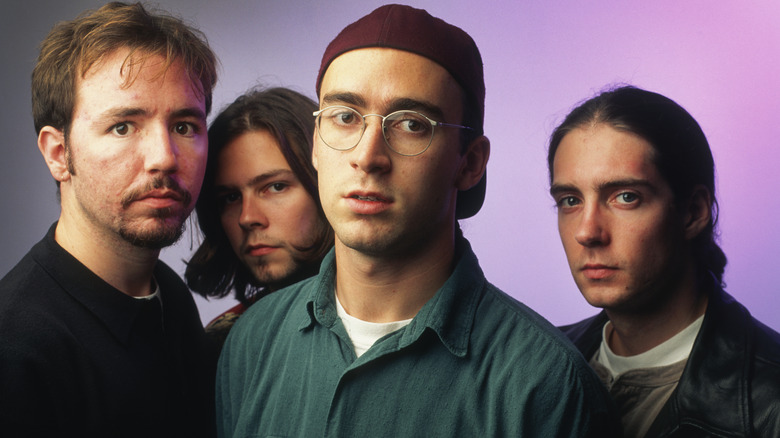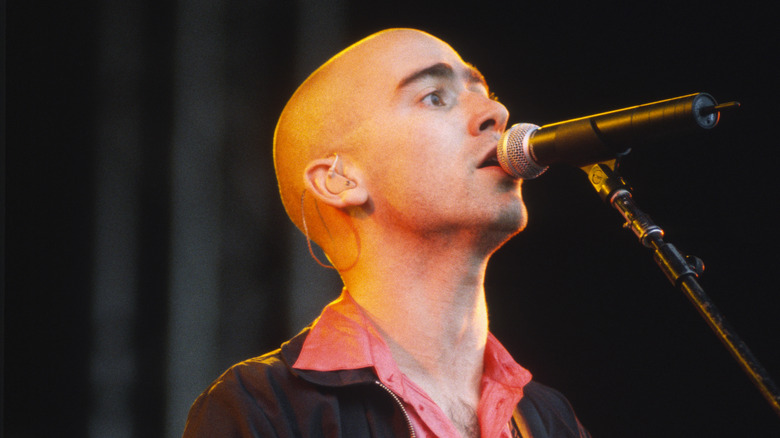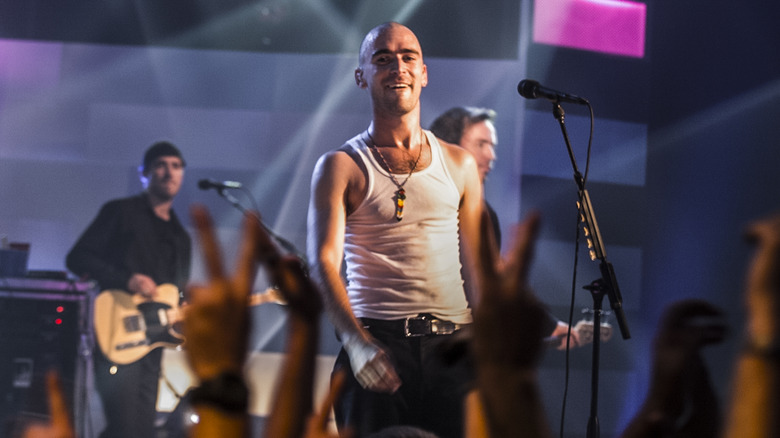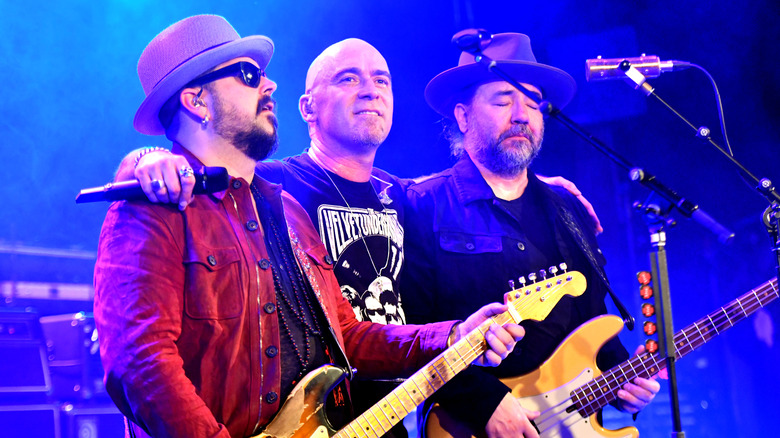Why You Rarely Hear About Live Nowadays
Formed in the early 1980s by a group of middle school friends (via AllMusic), Live was one of the many bands that rose to fame in the wake of the early '90s alternative rock explosion. While many of their peers opted for doom, gloom, and loud, fuzzy guitars, the foursome from York, Pennsylvania, was largely influenced by bands such as U2 and R.E.M., blending introspective lyrics with surprisingly accessible melodies. This formula fueled the success of their 1994 album "Throwing Copper," which took almost a whole year to reach the top of the Billboard 200 but featured several would-be '90s rock staples, including "Selling the Drama," "I Alone," "Lightning Crashes," and "All Over You."
Obviously, Live was far from a one-hit-wonder on the rock charts, but like many other contemporaries, their relevance peaked with their breakthrough album, and it was mostly downhill from that point onward. You just don't hear them mentioned in the same breath as the Smashing Pumpkins, Red Hot Chili Peppers, or any of the major grunge or nu-metal acts that respectively came before and after their commercial peak. So why is it that we rarely hear about Live now that it's been more than 25 years since they gave us all those unforgettable alt-rock classics?
Secret Samadhi wasn't Throwing Copper Vol. 2
"Throwing Copper" was a huge hit for Live for the very simple reason that its singles had tons of hooks, making them instantly recognizable and still beloved to this day by those who grew up during the heyday of alternative rock. And you can't go wrong with those memorable opening lines. Mention "And to love a god/And to fear a flame," and chances are your average '90s kid will associate the lyrics to "Selling the Drama." Mention "Our love is like water" and "All Over You" immediately comes to mind. "Lightning crashes/a new mother cries"? The first two words are the title of the song, and you should get the idea by now.
Meanwhile, try mentioning the opening line (or any line, for that matter) from most of the singles from Live's follow-up, 1997's "Secret Samadhi," and those same listeners will likely be stumped. While the album debuted at No. 1 on the Billboard 200, it petered out quickly (via NPR) and was lacking the musical and lyrical hooks that were ever-so-present on "Throwing Copper." It also got a fair amount of flak from critics, with Metroactive noting that frontman Ed Kowalczyk's Biblical, philosophical, and spiritual references in his lyrics were likely going to fly over the heads of typical teenage listeners. The publication also blasted the band for being largely derivative — even on their previous albums — and borrowing too much from the groups that influenced them.
They weren't in sync (pun partially intended) with the changing musical trends
The next reason behind Live's decline in popularity was partially touched on in the aforementioned review from Metroactive — trends in rock music were changing, and Live's brand of thinking man's alternative didn't quite fit in with all that electronica, ska-punk, and later on, nu-metal that was taking over the rock airwaves. It wasn't helping that rock, in general, was taking more and more of a backseat to bubblegum pop, as the pained angst of the early-mid-'90s grunge and alternative bands made way for the wholesome, inoffensive vibes of acts like NSYNC, the Backstreet Boys, and (at least at that point in her career) Britney Spears.
Granted, this was a problem that many other alternative rockers were facing in the late '90s, but it was particularly evident for bands like Live. Take their 1999 single "The Dolphin's Cry," for instance — the carrier single off their fifth album, "The Distance to Here." Yes, it was another big hit for the band on Billboard's rock charts, and it even cracked the Hot 100. But its uplifting message was an anomaly during a time when Korn's Jonathan Davis was singing about feeling like a freak on a leash and Limp Bizkit's Fred Durst was bragging about doing it all for the nookie and breaking stuff. And let's not get started on how it was too heavy for your usual "TRL" devotee.
They've yet to release a full-length album since Ed Kowalczyk's return
Save for another appearance on the Billboard Hot 100 with "Heaven" in 2003, the first decade of the 21st century was mostly quiet for Live ... until they went on hiatus in 2009. They returned two years later, but there was one member who was conspicuously absent, and that was lead singer Ed Kowalczyk, who was replaced by former Unified Theory frontman Chris Shinn. As it turned out, the fallout between Kowalczyk and his longtime friends and bandmates was quite a bitter one, with the rest of the band suing Kowalczyk over an old publishing agreement (and later suing so that he couldn't bill himself as a member "of" Live) and the ex-frontman speculating in an interview with Rolling Stone that the other guys were probably angry over the fact he was releasing a solo album without them.
Live only recorded one album with Shinn on vocals, 2014's "The Turn," and it was, by far, their lowest-charting record on the Billboard 200, peaking at an unremarkable No. 133. And in a surprising move considering the years of acrimony from both sides, Kowalczyk reunited with Live in 2016, stressing to Rolling Stone that he and his once-again bandmates wanted to focus in the meantime on playing more shows instead of working on a new album.
With the exception of the 2018 EP "Local 717," Live hasn't released a lot of new music with Kowalczyk back in the fold. He did, however, tell Spin in 2020 that the band had written several songs for an upcoming album. At that time, he was hoping for a 2021 release, but since that didn't come to pass, fans may have to wait a little longer for the classic lineup's first full-length effort since 2006's "Songs from Black Mountain."



